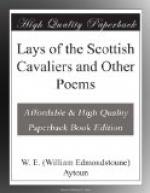“The dragoons, with worse conduct, were much more fortunate. In falling back, they had the good luck to find outlets from their respective positions by the roads which ran along the various extremities of the park wall, and they thus got clear through the village with little slaughter; after which, as the Highlanders had no horse to pursue them, they were safe. Several officers, among whom were Fowkes and Lascelles, escaped to Cockenzie and along Seton Sands, in a direction contrary to the general flight.
“The unfortunate Cope had attempted, at the first break of Gardiner’s dragoons, to stop and rally them, but was borne headlong, with the confused bands, through the narrow road to the south of the enclosures, notwithstanding all his efforts to the contrary. On getting beyond the village, where he was joined by the retreating bands of the other regiment, he made one anxious effort, with the Earls of Loudoun and Home, to form and bring them back to charge the enemy, now disordered by the pursuit; but in vain. They fled on, ducking their heads along their horses’ necks to escape the bullets which the pursuers occasionally sent after them. By using great exertions, and holding pistols to the heads of the troopers, Sir John and a few of his officers induced a small number of them to halt in a field near St. Clement’s Wells, about two miles from the battle-ground. But, after a momentary delay, the accidental firing of a pistol renewed the panic, and they rode off once more in great disorder. Sir John Cope, with a portion of them, reached Channelkirk at an early hour in the forenoon, and there halted to breakfast, and to write a brief note to one of the state-officers, relating the fate of the day. He then resumed his flight, and reached Coldstream that night. Next morning he proceeded to Berwick, whose fortifications seemed competent to give the security he required. He everywhere brought the first tidings of his own defeat.”
This victory operated very much in favour of Prince Charles. It secured him, for a season, the undisputed possession of Scotland, and enabled numerous adherents from all parts of the country to raise such forces as they could command, and to repair to his banner. His popularity in Edinburgh daily increased, as the qualities of his person and mind became known; and such testimony as the following, with respect to his estimation by the fair sex, and the devotion they exhibited in his cause, is not overcharged. “His affability and great personal grace wrought him high favour with the ladies, who, as we learn from, the letters of President Forbes, became generally so zealous in his cause, as to have some serious effect in inducing their admirers to declare for the Prince. There was, we know for certain, a Miss Lumsden, who plainly told her lover, a young artist, named Robert Strange, that he might think no more of her unless he should immediately join Prince Charles, and thus actually prevailed upon him to take up arms. It may be




